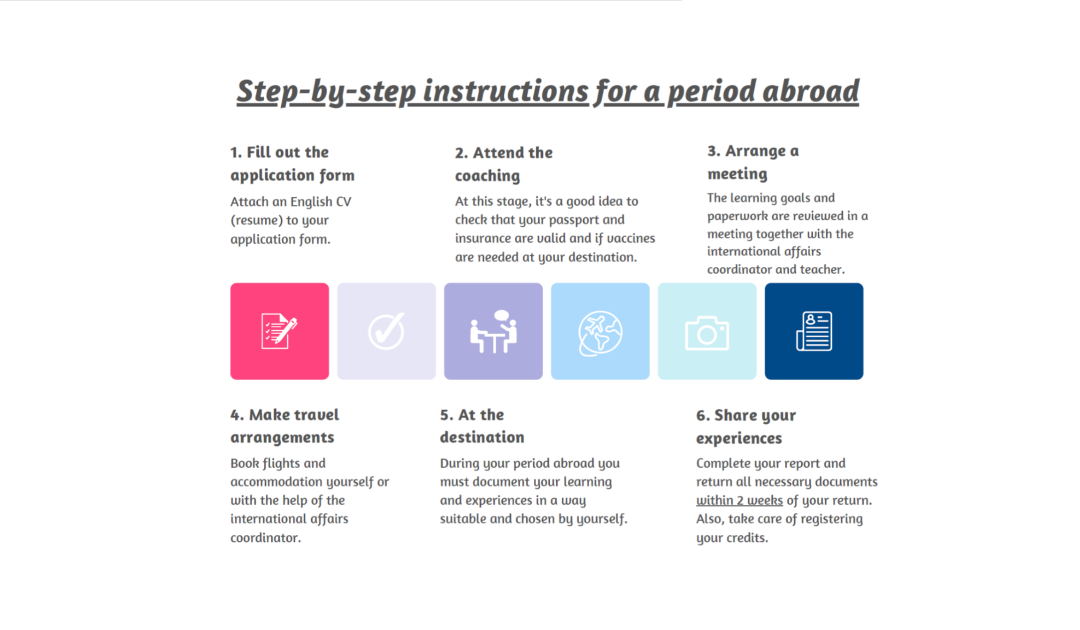Guide for mobility application
In Varia, our students have the possibility to do short and long semesters or periods abroad. The step-by-step instructions for going abroad can be found on this page.

One's time abroad can vary between 2 and 11 weeks, depending on the applicant's wishes and possibilities. The most common duration is about four weeks.
The applications for going abroad are open twice a year: those who apply in autumn leave before summer, and those who apply in spring leave before Christmas.
The entire application process can in total take at least three months. The duration of the process is influenced, for example, by how quickly positions matching the applicant's interest can be found among our international partner destinations and locations.
Step-by-step guide
1. Filling in the application form
The student first fills in the application (hakulomake opiskelijoille).
- Reserve enough time to fill in the application form, because in the application one must also provide more details e.g about their motivation.
- An English-language CV (Curriculum Vitae) must also be added as an attachment to the application form. You can use e.g. the European standard Europass CV.
CV, also known as Curriculum Vitae (resume), is a summary of your own competence, education and possibly other skills, such as language and IT skills. The attached CV is also sent to the receiving organization.
Going abroad requires the approval of the teacher in charge and, in the case of underage students, also parental permission.
- Usually, one month after sending the CV and application, the partners confirm the acceptance, after which the exact job position becomes clear in the following month or two.
2. Attending the coaching
The student enrols in the training course for the period abroad.
- The student verifies their passport's validity period and the necessary insurances. Varia will be insuring the student for work and free time.
- If necessary, the student gets all needed vaccines and a visa
- The student orders a European Health Insurance Card for free, from KELA.
- The student familiarizes themself with the crisis instructions for the study abroad period well before the trip.
- Students going on an Erasmus exchange must also take the first part of the OLS language test, which the student will receive by email.
3. Arranging a meeting
The student contacts their field's international affairs teacher and/or the school's international affairs coordinator and arranges a meeting. At the meeting, all the documents and contracts are reviewed and the necessary applications for the period abroad are filled out:
- Grant agreement
- International Training Agreement
- Europass Mobility
- Training agreement in StudentaPlus
- Applying for study benefit abroad from KELA (increased study grant)
4. Making travel arrangements
The student books flights and accommodation.
- Opiskelija tarkistaa, että jakson rahallinen tuki on turvattu, esimerkiksi Visa Electron -kortin nostoraja on tarpeeksi suuri ja kortti toimii ulkomailla.
- The student can use the checklist to review the necessary steps and documents.
Varia Student's Checklist for time abroad.pdf(pdf, 67.44 KB)
The international affairs coordinator and those in charge of international affairs, like IA teachers, are always there to support and help when needed.
5. After arriving
Although there are many new things to learn and to see when going abroad, the student must still take care of the following things when abroad:
- The student must remember to get signatures in time to all necessary and returnable documents and to bring the signed papers along when returning to Finland.
- In order for others to be able to enjoy time abroad, the student must document their learning and experiences during their trip. The student can choose their preferred way of making a travel report (e.g. text document, picture diary, blog, video). Detailed instructions for making a trip report:
- A short instructional video (in Finnish) for filming a digital story, i.e. a video story, can be found here.
- During their trip, the student must also make one Instagram post to the @internationalvaria account.
6. Sharing experiences
After the trip, it's time for the student to look back and think about what they got from the trip. Answering will get easier when you have had a chance to collect your thoughts after a few days of returning. Complete all reports and return all necessary documents within two weeks of arrival.
- The student arranges the return meeting with the coordinator of international affairs. At the same time, signed documents are also returned.
- The student completes their trip report and returns it to the international affairs coordinator.
- The student makes sure that he gets the competence points achieved during the period abroad for their own degree.
- If the student was on an Erasmus exchange, they will also receive the Erasmus participant report survey by email (the survey requires some thought: reflection on what was successful and what could have been better) and the second part of the OLS language test.
Still in doubt? Watch the video below
